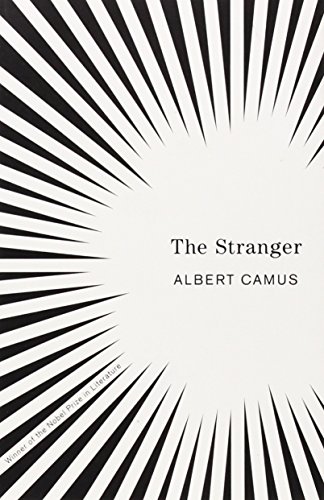All Nonfiction
- Bullying
- Books
- Academic
- Author Interviews
- Celebrity interviews
- College Articles
- College Essays
- Educator of the Year
- Heroes
- Interviews
- Memoir
- Personal Experience
- Sports
- Travel & Culture
All Opinions
- Bullying
- Current Events / Politics
- Discrimination
- Drugs / Alcohol / Smoking
- Entertainment / Celebrities
- Environment
- Love / Relationships
- Movies / Music / TV
- Pop Culture / Trends
- School / College
- Social Issues / Civics
- Spirituality / Religion
- Sports / Hobbies
All Hot Topics
- Bullying
- Community Service
- Environment
- Health
- Letters to the Editor
- Pride & Prejudice
- What Matters
- Back
Summer Guide
- Program Links
- Program Reviews
- Back
College Guide
- College Links
- College Reviews
- College Essays
- College Articles
- Back
The Stranger by Albert Camus
4.5 / 5
The Stranger is an unrelenting, oft-disturbing story of a man who stands unbroken and unbridled against society. He is destined for failure, but will not surrender to the expectations of his peers. M. Meursualt is a hardened, detached Algerian working the "Death of a Salesman" 9:00 to 5:00. He views life through shaded lens, a dark world, where shadows linger throughout the day, never fully covered by the light. His pessimistic detachment sets the stage for the book and drives the plot. Meursalt's conviction that life is essentially meaningless grates against his supporting cast and throws him into trouble time and time again, culminating in his senseless murder of an Arab assailaint on an empty beach. The meat of this story begins only after about 3/4 of the book has passed, when Meursault, in his jail cell, boredly awaiting his murder trial, begins to justify his belief system, echoing its author, the esteemed existentialist, Albert Camus. Does life has intrinsic meaning? What gives it this meaning? Is it worth living? Is there a difference between living and existing? These are questions Meursault indirectly aims to answer.
A longer review, assuming a somewhat vast knowledge of literature follows:
This book is unlike anything I have ever read. It features the somewhat-veiled introspection and philosophy of The Old Man and the Sea's Santiago, the discomforting sociopathy of the Doyle's Sherlock Holmes, and all the world-weariness of Voltaire's Candide or Conrad's Heart of Darkness. It's an interesting, but unsettling, combination.
Due to the fact it is different in purpose than anything I have reviewed here, I will use a different scale, judging on plot, prose, characters, and effectiveness. The last will he weighted hardest. There will be a summary at the bottom of this page.
-Plot- (4/5)
The plot reminds me of Candide in a strange way. Like Canside, Meursault's life falls apart, but his beliefs never do. The entire book follows a detached, but hard-working Algierian man and his forced interactions with the world. By the second half of the novel, he's on trial for murder, and like Voltaire's character, begins to decipher (Camus's view of) the human condition and the meaning of life. Meursault chafes against society and the friction drives the plot.
-Prose- (3.75/5)
Frankly, The Stranger doesn't shine in its English in the same way it did in French. The translation retains much of the beauty of Meursault's soliloquies and a fine opening and conclusion. The rest of the novel is simply serviceable. This, I believe, is intentional. The short, oft-fragmented first-person perspective showcases the protagonist's character. The prose is plain and occasionally disjointed, so I have reduced it accordingly, but once the narrator is taken into account, the style fits Meursault's disinterest in the world around him. This somewhat negates the basic nature of the prose and adds great atmosphere.
Expect this book to take longer than its page count suggests, the structure will slow many readers down.
-Characters- (5/5)
This aspect of the novel brings me back to Hemingway. The brevity of the novel causes some characters to be entirely defined by indirect characterization. The characters seem flat initially, but the book shows them their initial images (as portrayed by detached Meursault) to be a deceptive facade. This will be loved by readers who want to decipher characters.
As for Meursault himself, well he's a treat of a character: Meursault is a sociopath, but not in the lovable Sherlockian way. He is detached, and probably depressed as well. This is seen from the very first line of the book, in which he shows more interest in the weather than his mother's death.
His sociopathy causes him to chafe against the expectations of his peers, drawing him into further detachment. His deteriorates as the novel progresses.
-Effectiveness- (5/5)
Camus had an agenda; he was the head of the post-war Existentialist movement. Existentialism was a difficult sell, and Camus tried to personify and arguably justify his belief with L'Etranger. It didn't achieve his end goals; Existentialists are still misunderstood. That being said, with a little background on Existentialism, mindful readers of this book will understand it.
---
In conclusion, the Stranger is a fantastic, if a bit slow read. To truly appreciate it, readers should be familiar with Camus and his beliefs. The book is a haunting, but beautiful tale with deceptively complex characters, immersive prose, and a chilling perspective on human society. On top of this, it explains the thought of the Existentialist movement
There is a reason this is so well known among the classics. It is an atmpsheric, powerful, and conveniently brief must-read.
Similar Articles
JOIN THE DISCUSSION
This article has 0 comments.


I'm a student who undertook a 2,000 page quest through landmark literature over the summer. The quest failed, but it's left me with 1600 pages of material to review. It's mostly heavy stuff, but great, as time has proven.